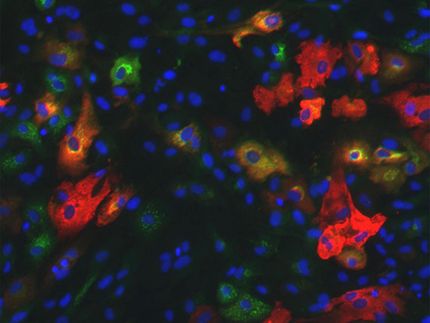Protein may play role in cell growth
Protein known for repressing genes may play role in cell growth and cancer
A protein known for repressing genes has surprised researchers: It not only activates some genes involved in the regulation of cell growth and signaling, but also may play a role in preventing cancers by inhibiting cell proliferation.
Published in Genes and Development, the Cornell study finds that the protein macroH2A1 may play previously unknown roles in activating genes. The discovery is surprising, say the researchers, because the protein has long been known to repress genes on one of the two X chromosomes in female mammals.
Female mammals have two X chromosomes with duplicate copies of genes - one set must be shut down to properly balance the products that those genes express. MacroH2A1 represses gene expression on the inactive X chromosome.
However, the new work shows that macroH2A1 also regulates genes on chromosomes not involved in determining an organism's sex, which are called autosomes, and that it can activate, as well as repress, genes.
"We found that in some repressed regions of autosomes, there are genes that escape repression, and macroH2A1 is actually needed to express those genes," said W. Lee Kraus, professor of molecular biology and genetics, and the paper's senior author. Mathew Gamble, a former postdoctoral researcher in Kraus' lab and now an assistant professor at Albert Einstein College of Medicine, is the paper's lead author.
MacroH2A1 is classified as a histone variant, which means that it resembles the normal histone proteins that package DNA in the cell's nucleus. But macroH2A1 is extended by an additional protein domain that can bind with other proteins and help them associate with a cell's genetic material. Since some forms of this extra "macrodomain" have the ability to bind to small molecules, it may potentially be used as a target where specially designed drugs may bind, said Kraus.
When macroH2A1 is absent, previous studies have reported that cells may lose their ability to shut down and, therefore, grow aberrantly, leading to cancer. Researchers are now using macroH2A1 to predict the risk of lung cancer recurrence.
Most read news
Organizations
Other news from the department science

Get the life science industry in your inbox
By submitting this form you agree that LUMITOS AG will send you the newsletter(s) selected above by email. Your data will not be passed on to third parties. Your data will be stored and processed in accordance with our data protection regulations. LUMITOS may contact you by email for the purpose of advertising or market and opinion surveys. You can revoke your consent at any time without giving reasons to LUMITOS AG, Ernst-Augustin-Str. 2, 12489 Berlin, Germany or by e-mail at revoke@lumitos.com with effect for the future. In addition, each email contains a link to unsubscribe from the corresponding newsletter.



















































